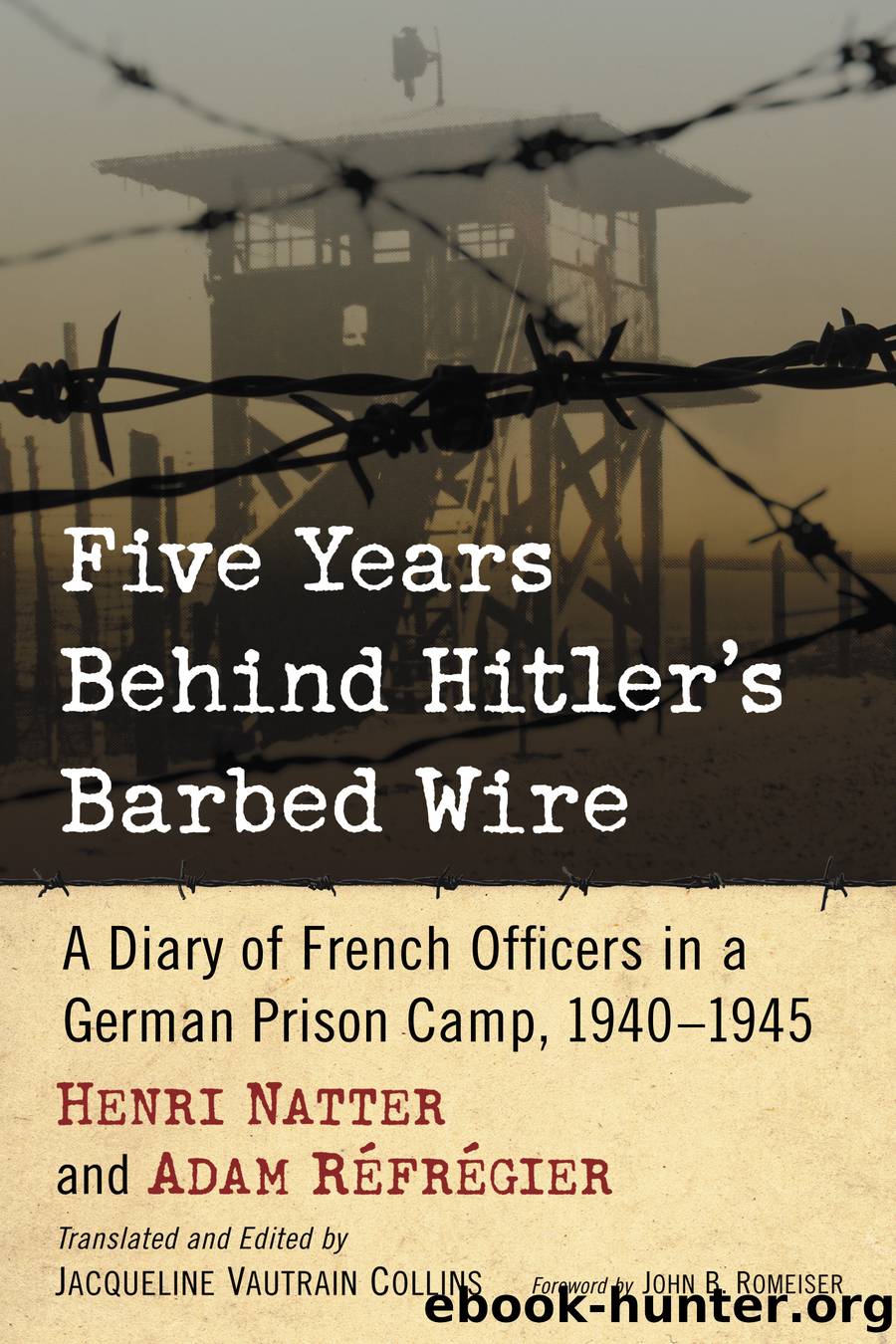Five Years Behind Hitler's Barbed Wire by Henri Natter

Author:Henri Natter
Language: eng
Format: epub
Publisher: McFarland & Company, Inc., Publishers
Published: 2015-10-30T00:00:00+00:00
10
Reaching Mid-Point
JuneâDecember 1942
5 JuneâB. ⦠has just been recaptured in the pinewoods, which border the road to Göpfritz. He jumped too early out of the truck, in which he drove out of the camp. Noticed by the sentry in a watchtower, he was the object of a turbulent manhunt.
10 JuneâThe stadium and the university are the only places kept open. The latter has been modified. Cardboard partitions divide the west room into three small rooms. The east room is reserved for the large lectures, which, lacking any other sources of entertainment, know a new boom.
12 JuneâBarbed wire on the left, barbed wire on the right, barbed wire in front, barbed wire behind, and barbed wire everywhere at all times. The only way to escape the obsession of this cursed grid; when the earth is warm lying down on oneâs back, and follow the moving changes of a cloud, the whirling of the larks, the migration of birds in full flight, or plunge into the infinity of the blue. For, they have not yet thought of putting a grid on the sky.
15 JuneâA wave of pessimism spreads over the camp; the British are defeated in Libya and retreat toward Egypt.
Unrest grows concerning work in Germany. In reality there are few volunteers. At the time of their departure they are subjected to hostile demonstrations, actually mistreatment, adding insult to injury to Mr. Loyalâs exasperation.
The university had become such an important part of the camp that the Germans probably thought it would cause too much turmoil to close it and would add to the on-going resistance; trouble in a camp often meant a transfer of the German high ranking officers to the Russian front. The men were determined to make their study count, following as closely as possible the same curricula as they would pursue in France. The number of well-known academics in the camp ensured that the exams conformed to those given in France, and a number of diplomas were recognized after the war. The university was also a source of general education; about two-thirds of the men were auditors. Numerous seminars in many disciplines reached well beyond the formal learning of a university.
Officially, there were three major departments, sciences, humanities, and law, and in addition a strong section for elementary school teachers, which in France would have belonged to a different institution than a university. The sciences benefited from three well-known scientists: Jean Leray, the dean and a mathematician, Etienne Wolff, a biologist, and François Ellenberger, a geologist, who organized a lab in the lavatory with microscopes built in the camp. The humanities were headed by a number of the officer POWs who had come from Nuremberg.
25 JuneâA powerful storm transforms the ditches into torrents. We are getting deeper and deeper into a black hole. The Germans have crossed the borders of Egypt and are getting ready to push their superiority in Russia. The V.B. and Das Reich describe with smugness the great maneuver that should lead to victory; a gigantic vise closing on the Russian oilfields on one side, and the Black sea on the other.
Download
This site does not store any files on its server. We only index and link to content provided by other sites. Please contact the content providers to delete copyright contents if any and email us, we'll remove relevant links or contents immediately.
Fanny Burney by Claire Harman(26602)
Empire of the Sikhs by Patwant Singh(23085)
Out of India by Michael Foss(16853)
Leonardo da Vinci by Walter Isaacson(13336)
Small Great Things by Jodi Picoult(7141)
The Six Wives Of Henry VIII (WOMEN IN HISTORY) by Fraser Antonia(5515)
The Wind in My Hair by Masih Alinejad(5095)
A Higher Loyalty: Truth, Lies, and Leadership by James Comey(4963)
The Crown by Robert Lacey(4814)
The Lonely City by Olivia Laing(4801)
Millionaire: The Philanderer, Gambler, and Duelist Who Invented Modern Finance by Janet Gleeson(4478)
The Iron Duke by The Iron Duke(4354)
Papillon (English) by Henri Charrière(4274)
Sticky Fingers by Joe Hagan(4198)
Joan of Arc by Mary Gordon(4110)
Alive: The Story of the Andes Survivors by Piers Paul Read(4031)
Stalin by Stephen Kotkin(3965)
Aleister Crowley: The Biography by Tobias Churton(3640)
Ants Among Elephants by Sujatha Gidla(3467)
